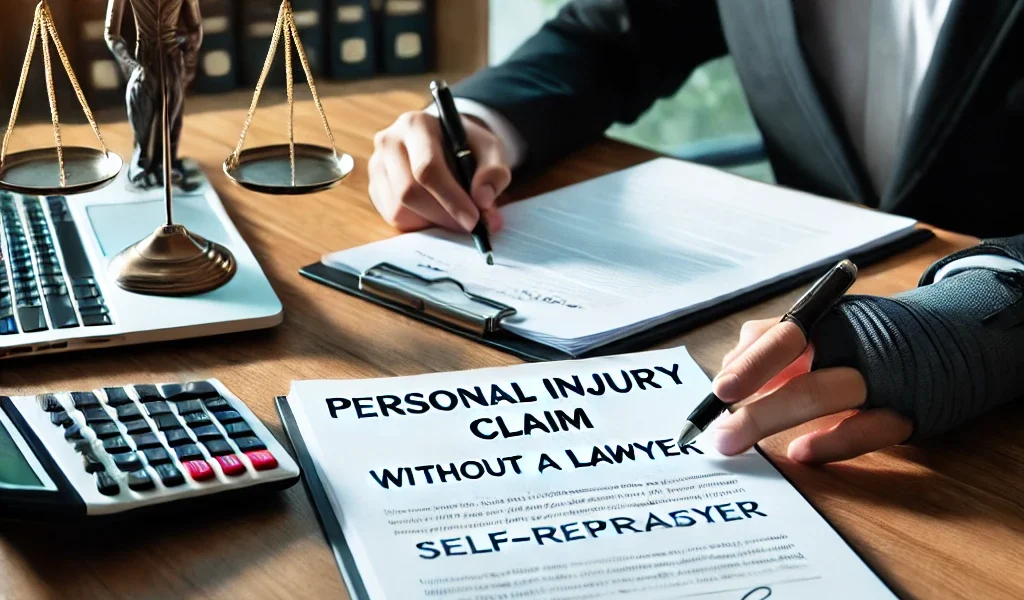Introduction
If you’ve been injured due to someone else’s negligence, you may wonder whether you need a lawyer to file a personal injury claim. While hiring an attorney can significantly improve your chances of success, it is not legally required. Many individuals choose to handle their claims on their own, especially for minor cases. However, there are pros and cons to consider before making this decision.
In this guide, we’ll discuss whether you can file a personal injury claim without a lawyer, the steps involved, and the challenges you may face.
When You Can Handle a Personal Injury Claim on Your Own
There are some situations where handling your claim without legal representation is feasible:
1. Minor Injuries with Clear Liability
- If your injuries are minor (such as small cuts, bruises, or mild whiplash) and do not require extensive medical treatment, you may not need a lawyer.
- Liability should be clear and undisputed, meaning the at-fault party admits responsibility.
2. Accidents with Minimal Damages
- If your property damage is minor and your medical expenses are low, hiring a lawyer may not be cost-effective.
- Insurance companies may offer fair settlements without prolonged legal battles.
3. You Are Comfortable Negotiating with Insurance Companies
- If you’re familiar with the insurance claims process and willing to negotiate, you can represent yourself.
- Some states have consumer protection agencies that offer guidance.
4. You Understand Legal Procedures
- If you are familiar with filing deadlines, court procedures, and required paperwork, you may successfully handle your case.
- Small claims courts often have simpler procedures for resolving minor disputes.
When You Should Consider Hiring a Lawyer
While handling a claim yourself is possible, certain cases require professional legal assistance:
1. Severe or Long-Term Injuries
- If your injuries require ongoing medical treatment, rehabilitation, or have caused permanent disability, a lawyer can help maximize compensation.
- Complex medical evidence may be required to prove the full extent of your damages.
2. Disputed Liability
- If the at-fault party denies responsibility, you may need legal expertise to gather evidence and prove negligence.
- States with comparative negligence laws may reduce your compensation if you are partially at fault.
3. Dealing with Insurance Companies
- Insurance companies often try to minimize payouts or deny claims altogether.
- Lawyers understand tactics insurers use and can negotiate better settlements.
4. Statute of Limitations Issues
- Each state has a deadline (statute of limitations) for filing personal injury claims.
- Missing the deadline bars you from seeking compensation, making legal guidance essential.
5. Complex Legal and Procedural Issues
- If your case involves multiple parties, medical malpractice, or government entities, it will be legally complex.
- A lawyer ensures proper filing, evidence collection, and legal compliance.
Steps to File a Personal Injury Claim Without a Lawyer
If you decide to proceed without legal representation, follow these essential steps:
Step 1: Gather Evidence
- Take photos and videos of the accident scene, injuries, and property damage.
- Obtain witness statements and their contact information.
- Secure copies of police reports, medical records, and bills.
Step 2: Determine Liability
- Research state laws on negligence and fault.
- If liability is unclear, you may need expert testimony or additional evidence.
Step 3: Calculate Your Damages
- Include medical expenses, lost wages, property damage, and pain & suffering.
- Use online settlement calculators as a rough guide.
Step 4: File an Insurance Claim
- Notify the at-fault party’s insurance company.
- Provide supporting evidence but avoid making statements that could reduce your claim.
Step 5: Negotiate a Settlement
- Expect an initial lowball offer from the insurer.
- Be prepared to counteroffer with documented evidence.
- If negotiations fail, consider mediation or small claims court.
Step 6: File a Lawsuit (If Needed)
- If the insurance company refuses to settle, file a lawsuit in civil court.
- Understand court filing fees, deadlines, and procedural rules.
- Represent yourself in hearings or consider hiring a lawyer for trial.
Pros and Cons of Filing a Claim Without a Lawyer
Pros:
✅ Saves Money – You avoid attorney fees (typically 30-40% of settlement amounts). ✅ More Control – You make all decisions regarding your claim. ✅ Faster Process – No delays from legal procedures.
Cons:
❌ Risk of Low Settlement – Insurance companies may underpay your claim. ❌ Legal Complexity – Lack of legal knowledge may weaken your case. ❌ Time-Consuming – Research, paperwork, and negotiations require significant effort.
Conclusion
Filing a personal injury claim without a lawyer is possible, but it comes with risks. If your case involves minor injuries and clear liability, you may successfully handle it on your own. However, for serious injuries, disputes, or complex legal issues, hiring an experienced personal injury attorney greatly improves your chances of receiving fair compensation.
Before making a decision, assess your case carefully. If you have any doubts, consult a lawyer for a free case evaluation to determine the best course of action.




